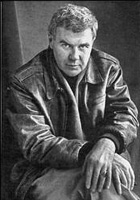The Cobweb Poem by Raymond Clevie Carver
The Cobweb
Rating: ★2.9
A few minutes ago, I stepped onto the deck
of the house. From there I could see and hear the water,
and everything that's happened to me all these years.
It was hot and still. The tide was out.
No birds sang. As I leaned against the railing
a cobweb touched my forehead.
It caught in my hair. No one can blame me that I turned
and went inside. There was no wind. The sea
was dead calm. I hung the cobweb from the lampshade.
Where I watch it shudder now and then when my breath
touches it. A fine thread. Intricate.
Before long, before anyone realizes,
I'll be gone from here.
Anonymous submission.
Thursday, January 1, 2004
READ THIS POEM IN OTHER LANGUAGES
This poem has not been translated into any other language yet.
I would like to translate this poem
Poems By Raymond Clevie Carver

In Raymond Carvers poem “The Cobweb” it describes an understanding in which he walks into a cobweb and then brings it back into his house, where he thinks about it and reflects on how it, like life, is fragile. This poem resonates to me a few meanings, because when a person grows older they start to questions the delicateness of life, which is symbolized in this poem by a cobweb. Carver uses his encounter with nature represented by the water, the sea, and the cobweb as an opportunity to dwell on his past and connote his own fate. The symbolism of the web and tides, the auditory, kinesthetic, and visual imagery, and the gentle tone in “The Cobweb” enhances the overall theme of nostalgia and imminent death to bring a sense that there is no escape of mortality. Carver invites us into his poem strongly by just the first few lines stating, “A few minutes ago, I stepped onto the deck / of the house. From there I could see and hear the water, / and everything that’s happened to me all these years.” This depicts that the writer is showing us that the speaker (I’m guessing Carver himself) has lived many years. In the beginning the theme of nostalgia comes to the reader as he enters us into a world, where he is at a house, standing on a deck by the sea, reflecting on his years passed. Carver also provides the reader with visual and auditory imagery by stating the he see’s and hears the water. This imagery is important, because it makes us picture a scene in our mind that this is a somewhat large body of water, since the poem reads, “The tide was out.” Tides are a symbol for a state of flux, much like a human life, where we are constantly moving in and out of states of emotions and crashing against other peoples lives and sometimes our own. The midsection of the poem lets us know that there is a calm presence to Carver’s words. In lines four through six, “It was hot and still. The tide was out. / No birds sang. As I leaned against the railing / a cobweb touched my forehead.” Carver uses short sentences describing the weather. The hot and still air and the quiet evoke a feeling of emptiness and calm, possibly proposing the speaker's own reflective state of mind. When the speaker states, “It caught in my hair. No one can blame that I turned and went inside. There was no wind. The sea was / dead calm. I hung the cobweb from the lampshade.” These lines reveal that leaning into a cobweb emphasizes that he is paying more attention to what is happening inside of him than his surroundings. Cobwebs can be symbolic in a sense for viscosity, or a feeling of being caught in something from which one cannot escape. After hearing this line of the cobweb it made me react to see where this poem is headed, given the poem being titled “The Cobweb.” The poet creates a rhythm suggestive of the sea's tides, his breath on the cobweb, and the physical structure of the web itself by using longer and shorter sentences in the few last lines, “Where I watch it shutter now and then when my breath / touches it. A fine thread. Intricate.” Its fragility and intricacy also suggests the same for human life. This comparison is underlined in the poem's last two lines when the speaker states, Before long, before anyone realizes, / I'll be gone from here. Here the theme takes a sharp turn towards death, as readers understand that he's not referring to leaving to go out for a walk, however it simply pertains to dying. “The Cobweb” is a short poem, only thirteen lines long, and written in short and choppy sentences, which represent the images the speaker connotes to the reader about the frailty of life. The suggestion is that human beings are fragile, and there is no escape of the invention that we call death. What is confusing, however, is the suddenness with which the speaker acknowledges his own impending death, after what seems an innocent description of a rather unexciting experience with a cobweb. BY SEAN SHEARER